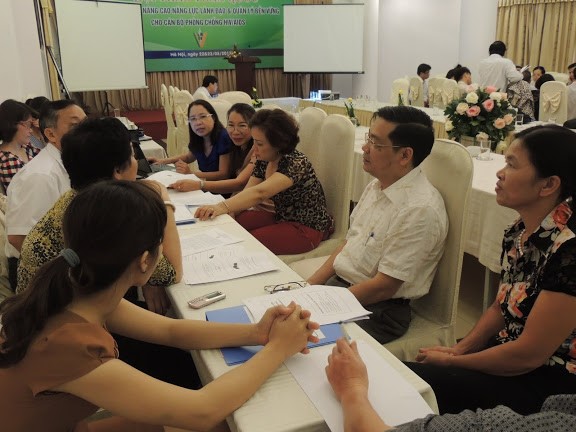Establishing a professional network for HIV/AIDS health care workers

Conference participants discussing the sharing program successes.
On May 22-23, 2013, international and national HIV/AIDS leaders, health care workers and organizations convened in Hanoi on “Networking for Sustainable Leadership and Management Capacity Building for HIV/AIDS personnel.” The goal of the conference was to develop a forum to share program results and challenges, participate in capacity building workshops, discuss future plans for expansion, and launch an alumni network to enhance technical collaboration at the national and provincial levels. This is the third annual national conference of the Vietnam Leadership and Management Capacity Strengthening program (VLMCS).
Supported by PEPFAR, VLMCS is a collaborative effort between CDC, the Hanoi School of Public Health (HSPH), Sustainable Management Development Program (SMDP), and the Vietnam Authority of AIDS Control (VAAC). VLMCS was established to build the institutional capacity and sustainability of Vietnam’s public health workforce, with a focus on improving the effectiveness and quality of the HIV/AIDS programs.
Since 2006, the program has trained a total of 665 public health professionals in 61 of the 63 provinces in management and leadership skills, including Quality Improvement, Project Management, Project Evaluation and Supportive Supervision. VLMCS has implemented more than 200 applied management improvement projects that have improved the efficiency and effectiveness in HIV/AIDS prevention, care and treatment core program activities.
Dr. Michelle McConnell, Country Director of CDC Vietnam, Dr. Gary West, Country Director of FHI 360 Vietnam, Dr. Pham Duc Manh, VAAC Deputy Director/MOH, Prof. Bui Thi Thu Ha, HSPH Deputy Dean, international and national experts, the leaders of Provincial AIDS Committees, VLMCS’ trainers, alumni in 3 regions of Vietnam and other relevant sectors attended the event.
“CDC strongly believes that by strengthening individual and institutional management capacity, our partners and the alumni here are contributing towards a positive systemic change in the way Vietnamese institutions implement public health programs, which will benefit their clients and patients. As we move towards a sustainable and country-owned HIV response, it is critical that we maintain and build upon our efforts thus far and promote the institutionalization of these activities as much as possible,” CDC Vietnam Country Director, Dr. Michelle McConnell said.

Plenary photo of the delegates of the conference.
There is a large and growing unmet need for enhanced leadership and management training for HIV/AIDS health care workers across the country. It is not only financial resources that are needed for sustainability of the HIV/AIDS program in Vietnam.
“Many centers for HIV/AIDS have no office, equipment and expertise and management staff lacks in quantity and quality. In addition, staff working in provinces lack management experience and leadership skills, making it difficult when conducting HIV/AIDS activities,” said Pham Duc Manh, VAAC Deputy Director.
Conference participants discussed the development of a VLMCS alumni network and the roles of stakeholders in network building and making it sustainable. An alumni network would reinforce the training already received and provide a platform for health professionals to communicate and share successes and challenges.
Dr. Gary West of FHI360 shared, “The ideas that you can learn and share among yourselves and the network is extremely viable. We actually try to promote this in innovation in our program so that we form communities of practice so that people can learn from each other.”